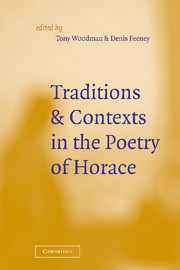Book contents
- Frontmatter
- Contents
- List of contributors
- Prologue
- Acknowledgements
- 1 HORACE'S BIRTHDAY AND DEATHDAY
- 2 AMICVS CERTVS IN RE INCERTA CERNITVR: Epode I
- 3 DREAMING ABOUT QUIRINUS: Horace's Satires and the development of Augustan poetry
- 4 BIFORMIS VATES: the Odes, Catullus and Greek lyric
- 5 THE ODES: just where do you draw the line?
- 6 A WINE-JAR FOR MESSALLA: Carmina 3.21
- 7 FEMININE ENDINGS, LYRIC SEDUCTIONS
- 8 THE UNIQUENESS OF THE CARMEN SAECVLARE AND ITS TRADITION
- 9 SOLVS SAPIENS LIBER EST: recommissioning lyric in Epistles 1
- 10 POETRY, PHILOSOPHY, POLITICS AND PLAY: Epistles 1
- 11 HORACE, CICERO AND AUGUSTUS, OR THE POET STATESMAN AT EPISTLES 2.1.256
- 12 VNA CVM SCRIPTORE MEO: poetry, Principate and the traditions of literary history in the Epistle to Augustus
- 13 EPILOGUE
- Notes
- Abbreviations and bibliography
- Indexes
8 - THE UNIQUENESS OF THE CARMEN SAECVLARE AND ITS TRADITION
Published online by Cambridge University Press: 22 September 2009
- Frontmatter
- Contents
- List of contributors
- Prologue
- Acknowledgements
- 1 HORACE'S BIRTHDAY AND DEATHDAY
- 2 AMICVS CERTVS IN RE INCERTA CERNITVR: Epode I
- 3 DREAMING ABOUT QUIRINUS: Horace's Satires and the development of Augustan poetry
- 4 BIFORMIS VATES: the Odes, Catullus and Greek lyric
- 5 THE ODES: just where do you draw the line?
- 6 A WINE-JAR FOR MESSALLA: Carmina 3.21
- 7 FEMININE ENDINGS, LYRIC SEDUCTIONS
- 8 THE UNIQUENESS OF THE CARMEN SAECVLARE AND ITS TRADITION
- 9 SOLVS SAPIENS LIBER EST: recommissioning lyric in Epistles 1
- 10 POETRY, PHILOSOPHY, POLITICS AND PLAY: Epistles 1
- 11 HORACE, CICERO AND AUGUSTUS, OR THE POET STATESMAN AT EPISTLES 2.1.256
- 12 VNA CVM SCRIPTORE MEO: poetry, Principate and the traditions of literary history in the Epistle to Augustus
- 13 EPILOGUE
- Notes
- Abbreviations and bibliography
- Indexes
Summary
QUALITY
The Carmen saeculare occupies an average of four pages in the printed editions of Horace, and leads a quiet life in an angulus at the margins of his lyric corpus. It was transmitted by our medieval manuscripts and is occasionally quoted by late antique grammatici, just like the rest of what Horace published. Yet there is some uneasiness in the background of modern and contemporary interpretation. The 76-line poem has never been the subject of specific commentaries, nor is it normally included in twentieth-century annotated editions of the Odes, or given a fair amount of space in book-length essays and explications de texte. The only clear exception flags itself as an exception, because Eduard Fraenkel's extended treatment in his Horace (1957) is a tense and vibrant apology, not a normal example of academic discussion. Had the author written in the same vein about, say, Carm. 1.10, he would be considered an eccentric instead of a master of Latin studies.
Two reasons for this special status deserve mention here. One is that the poem was performed in a context that for a long time, and for some time to come, can be perceived as pre-Fascist, and was mostly admired in the moral climate of European twentieth-century nationalism.
- Type
- Chapter
- Information
- Traditions and Contexts in the Poetry of Horace , pp. 107 - 123Publisher: Cambridge University PressPrint publication year: 2002
- 17
- Cited by



